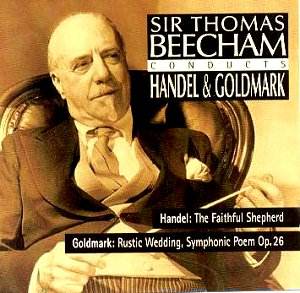Here is the return of a firm favourite. That said the
Goldmark has drifted in and out of the catalogue over the years since
its first appearance in 1952. I well remember the agitated correspondence
columns in the pages of the Beecham Society newsletter pleading for
the CBS discs to be returned forthwith to the domestic catalogue. And
so now Sony is doing this series of impressive recordings proud in their
Beecham edition with sumptuous photographs and fine "insider"
notes from Graham Melville-Mason. Regarded as a classic very little
in the intervening half century has managed to dim its vivacity, verdancy
and sheer affection – nor that of the lustrous playing of the Royal
Philharmonic and particularly its principals, who do so much to garnish
Goldmark’s delectable creation. True, some have used the Symphony and
this recording of it as a stick with which to beat Beecham – a glorious
performance of not so sophisticated music is a target of sorts I suppose,
if not a very edifying one and few conductors could escape the whipping
if that was the criterion.
The recording has come up splendidly in Sony’s transfer,
though I think uniquely in this series all recording dates are omitted
(Sony are poor in their re-release series generally when it comes to
dates and locations of recording but are usually good with the Beecham
series). Acknowledging the cut he makes (Variations eight and ten of
the Wedding March) this is still a sovereign example of the complete
command of phrasing and tempo relation. The horn and trombone in the
Wedding March and the skirling violins announce performances of real
drama and colour. The way the woodwind chatter and flutter above the
burgeoning string figuration is judged with effortless delicacy. It
doesn’t often seem to be mentioned but I’m sure Beecham’s unrivalled
success here is due to his affinity with the almost balletic and French
influences on Goldmark, ones the conductor exploits with finesse and
delicacy. The expressive contouring and seamlessness of the Bridal Song
are magnetic – in terms of direction and sonority – and the little running
pizzicati in the Serenade, the brass-led folk aeration with its little
clarinet roulades, are all marvellously pictorial and full of delicate
tracery. The reigned–in passion of the Garden scene, its headily evocative
atmosphere, is treasurable (is that a fractional drop-out in one of
the channels at 4.16?) and leads to a coda of utter tranquillity and
lyrical beauty. And when it comes to clarity and dynamism Beecham produces
it in the dancing finale (though it would have helped if the violins
had been divided à la Boult for the opening section which loses
its antiphonal potential). The reminiscences of the earlier material
however, recollections bathed in affectionate generosity, are the ne
plus ultra of sumptuous phrasing.
The Faithful Shepherd, one of Beecham’s Handelian adaptations,
is an eight-movement work of pieces from Il pastor fido of 1734
and other works as well (Parnasso in Festa for example) but as
ever with Beecham the suites were frequently interchangeable. What one
never fails to get is a warmth and a liveliness. So the opening Introduction
has great string depth, the solo flute in the Adagio has expressive
delicacy and there is graciousness and lordly beneficence in the Musette
(Beecham loved a good Musette). The ardent unforced simplicity of the
Minuet is wonderful as are the beautifully controlled dynamics of the
Pastoral (from Parnasso in Festa, later recycled for The
Triumph of Truth and Time).
I believe the Goldmark is available in Volume 2 of
the Beecham Collection on Idlewild IDLR014 where it’s coupled with Dvorak’s
Symphonic Variations. I’ve not heard it but I doubt it will sound better
than these Sony transfers remastered by Gary Moore. Another feather
in the cap for Sony’s Beecham series. Don’t stop now!
Jonathan Woolf

